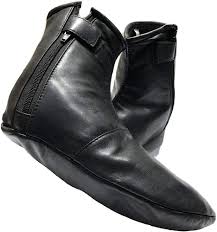Leather Socks
Leather socks, also known as khuffs or khuffayn in Arabic, are a traditional Islamic footwear item worn by Muslims, particularly during the practice of ablution (wudu), the ritual washing performed before prayers. These socks are typically made from leather, often goat leather, and are designed to cover the feet up to the ankles or slightly higher.
Description
The use of leather socks serves several purposes in the context of wudu:
1. Water Resistance:
Leather is naturally water-resistant, which means that when worn during wudu, it helps to prevent water from seeping through to the feet. This is particularly beneficial when performing wudu outdoors or in situations where water may be scarce, as it allows individuals to complete their ablution without worrying about wetting their feet excessively.
2. Durability:
Leather socks are known for their durability and longevity. Unlike traditional cotton socks, which may wear out quickly or become damaged with frequent washing, leather socks can withstand regular use and maintain their integrity over time. This durability ensures that individuals can rely on their leather socks for repeated use during wudu without concerns about deterioration.
3. Ease of Use:
Leather socks are easy to put on and take off, making them convenient for use during wudu. Their simple design and snug fit ensure that they stay in place during ablution without slipping or causing discomfort. Additionally, some leather socks feature elastic or adjustable straps to provide a secure and customized fit for the wearer.
4. Hygienic Considerations:
Leather socks offer hygienic benefits by providing a protective barrier between the feet and the ground during wudu. This is particularly important in public spaces where the cleanliness of the floor may be a concern. By wearing leather socks, individuals can maintain a sense of cleanliness and purity while performing their ablution rituals.
In summary, leather socks are a practical and beneficial accessory for Muslims performing wudu. Their water-resistant properties, durability, ease of use, and hygienic considerations make them a valuable addition to the religious practices of individuals striving to fulfill the requirements of Islamic ritual purification.

